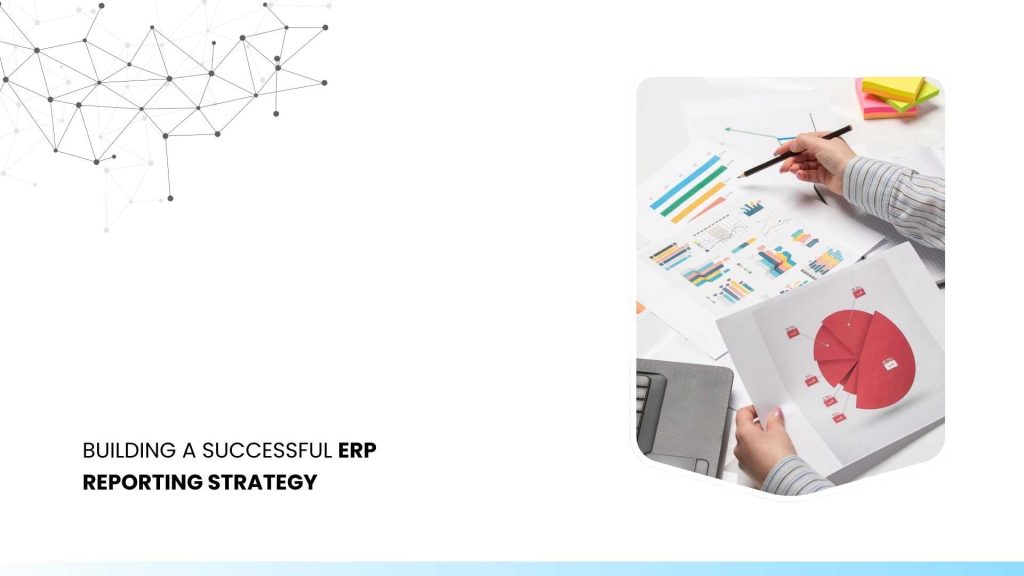As companies struggle to manage large amounts of enterprise data, developing a sustainable ERP reporting strategy is crucial. A successful reporting strategy should prioritize using clean, consistent, and well-defined data to help companies drive growth, improve their profitability, and enhance their overall competitiveness.
Building a future-ready ERP reporting strategy
Nowadays, businesses face overwhelming data and search for more effective ways to achieve almost real-time reporting, data visualization, and useful insights. This information can aid in making decisions that drive competitive advantage, growth, and profitability.
The leading companies are taking the next step and using analytics to identify problems and trigger automated responses to enhance their processes. Let’s explore some common challenges and how a reporting strategy can help.
Common Challenges
Data not Captured for Reporting:
Many companies need help with data that is adequately captured for reporting purposes. This challenge can lead to incomplete or inaccurate insights, hindering informed decision-making. Addressing this issue requires a systematic data collection and storage approach within the ERP system.
Misaligned Chart of Accounts:
A misaligned chart of accounts can result in clarity and consistency in financial reporting. Harmonizing the chart of funds across the organization ensures uniformity and accuracy in economic data, facilitating more reliable reporting and analysis.
Misaligned and Ad Hoc Reporting Hierarchies:
Inconsistent reporting hierarchies can lead to difficulties in aggregating data for analysis. Establishing standardized reporting hierarchies ensures a coherent and structured approach to data analysis, enabling meaningful insights that can drive strategic decision-making.
Ineffective Reporting Governance:
With proper reporting governance, organizations can handle data security, compliance, and accountability issues. Implementing effective reporting governance ensures that reporting processes are well-managed, data integrity is maintained, and stakeholders can rely on the information presented.
Key Elements for Successful ERP Reporting Strategy
Delivers Accurate Information
A successful ERP reporting strategy must prioritize accuracy. Ensuring data is captured, processed, and stored correctly is foundational to reliable insights. Regular audits and validation checks should be integrated into the reporting process to maintain data accuracy.
Financial Analysis and Business Analysis
Going beyond standard financial reporting, a successful strategy incorporates broader business analysis. It integrates non-financial metrics and operational data to provide a comprehensive business view, enabling more informed strategic decisions.
Provides a Single Source of Truth
Establishing a single source of truth is essential for eliminating data silos and ensuring consistency across the organization. A unified data repository reduces the likelihood of conflicting information, and fosters trust in the reporting process.
Roadmap to Bring the Insights
A successful ERP reporting strategy includes a roadmap for extracting actionable insights. It involves collecting data and defining a clear path to transform raw data into meaningful information that can guide strategic decisions.
Adoption to Changing Reporting Styles
Flexibility is key in the dynamic business environment. A successful strategy adapts to changing reporting styles, emerging technologies, and evolving business requirements. It ensures that the reporting system remains relevant and effective over time.
Conclusion
Acumatica stands out for its exceptional reporting and data analysis capabilities in ERP solutions. With Acumatica’s advanced reporting tools, businesses gain real-time insights into their performance, empowering decision-makers to make informed and timely decisions.
By providing a comprehensive view of business operations and financial metrics, Acumatica‘s reporting solution enhances the agility of organizations, enabling them to adapt swiftly to market changes and optimize their strategies for sustained success. It equips businesses with the tools to turn data into actionable intelligence, fostering a competitive edge in today’s dynamic business landscape.

Vijay comes with a vast experience in ERP and enterprise solutions space with about 20 years of experience in various packaged application like Acumatica, SAP, Orion, Salesforce.com, SugarCRM and, SalesLogix.

